#Insular Insight
Text
Supervillains for a community. (Well, except those jerks over in Gotham, insular lot, but they’re they’re one problem) Of course they do- supervillains are a group defined by strong opinions and a willingness to see them through, often with a healthy dash of societal failures and trauma as a catalyst.
The fentons, while not active even on the online message boards, are well known and explosive when they do show up, full of fascinating insights and hours long rants on mad science on hair pin turns courtesy of that ADHD attention span. Bit of the cryptids you feel honored to bump into kind of deal. Besides, like a good quarter of the community as it aged, they’d settled down and had kids (not necessarily in that order) and taken it very seriously! Out in the middle of nowhere, where even the most fearsome government outpost members, the local branch of the IRS, quake before them in fear. Out of the way.
Reveal gone okay-ish, Danny moves to Gotham still to get some air bc now things are Akward and he landed that engineering scholarship which is loads better than any other college would give him with his track record. So- the mysterious Fenton children are finally crawling out of hiding! Everyone is psyched! And roll in to Gotham en masse to witness the fireworks!
Except Danny is Determined To Be Normal. He’s had enough of the throwing himself into harms way shit for a lifetime- he wants to be free to peacefully built Rube Goldberg machines and unintentional increasingly complex bombs to his hearts content. JAZZ, on the other hand- the coveted token Normal One, has finally snapped! She’s watched her baby brother she practically raised throw himself into danger over and over and could do nothing, and now that she’s exposed to this whole network of superheroes outside of small town Amnity, some of those uglier emotions are coming out. And boy is she pissed! And can’t afford to show it much while filing the paperwork to have Arkham legally razed to the ground!
See I love this idea of like, niches in superhero society. A villain the heroes know they can plop their kiddo down with for an exciting afternoon brawl while they take care of a particularly grisly case and come back to a few hours later ranting about some new life lesson and a new move they really want to try. A villain who has a functioning moral compass despite their somewhat batshit long term goal and you can contact to fuck with another villains’s plan so they can laugh at them and you can have an easy afternoon. One who pries up hostile architecture and fills in pot holes, idk man. Get creative here, there’s such potential!
So Jazz becomes a Training villain- someone the heroes know their sidekicks will walk away from in a fight 100% of the time, usually with some new lesson to ponder and only a couple of bruises. Sometimes even snacks!
She also absolutely ambushes mentors to check that they’re worth the kiddo, which they appreciate once they get over being jumped in a dark alley by a 7 foot Amazon trained force of nature. They are not used to being on that side of the jumping, it’s a little unnerving.
(Yes, she low key adopts Shazam upon checking in with him on cursory ‘is the main hero of this city and asshole’ checkin. Yes, the super clones get yoinked out from under Superman’s negligent thumb to go have a blast with Ellie. What about it?)
This however only encourages more assorted weirdos to crawl out of the woodwork. It’s not often one of their own forfeits their potential spot for the running of the coveted Most Normal I Swear prize, but when they do it’s bound to be good! But jazz is off hounding various heroes and punching the faces in of pedophiles and shit whenever there’s no cape within easy reach, and so is a mite bit harder to contact than Danny, who has innocently gotten an apprenticeship under a clockworker for access to their workshop and is gleefully going about doing nerdy shit with great abandon.
Plus this is Gotham. No one gives a shit if someone in the Mad Alchemist uniform and still smoking from their latest experiment pokes their head in a window to bother the local shrimp teen- none of the usual social rules apply, everyone’s crazy here! So everyone drops any and all attempts at masking and just acts their genuine unhinged selves, much to the alarm of the Bats and frustration of Danny.
Bc he cannot get these mfers to go. Away. Even liberal use of the creep stick has little effect when the interloper is calibrated for an opponent with super speed or laser vision or whatever, and he’s trying to maintain his guise as a Normal College Student Do No Investigate.
So he calls in the big guns. He’s not super active in the supervillain kids group chat ever since things in amnity calmed the fuck down post becoming King and then immediately using a loophole that says he will not take the throne until he is grown, as defined by finishing learning his trade a la the medieval standards Pariah set up. So he can just take his sweet ass time with his graduate degree and out of inter dimensional bull shit that much longer! Point is, he hasn’t taken the chance to rant over there in a while, so his Crazy friends are getting a lil worried.
The change to come over and shout at their batshit crazy but (mostly) well meaning parent AND see Danny? Score!
The bats, however, are getting awfully suspicious about this one kid that villains from all over the country are flocking to, especially young and upcoming ones as of recently! And he’s acting his engineering course- all the worst rogues are known to have flown through their PhD studies prior to Cracking. They seem to have a real problem on their hands with this Fenton guy.
#dp x dc#dc x dp#mad science#supervillain community#bonus points if you can pull out some super niche comic villain#justice for kite man#local child of a crazy chemist: so you know that trick you showed me with the soda and the reaction that could turn into just like all foam#Danny: yeah and also back the fuck up#lcoacc: so it’s been like my comfort food right but like I started wondering what you could do#danny: oh no (he says while making what amounts of an overachieving smoke bomb)#lcoacc: so I was like what if I add more of a base to it so it could be solid and then maybe just like a LIL acid to see what happens#Danny: oh ancients#lcoacc: but then the killjoy supes came in a ruined everything from where I was ruining lex Luther’s day#Danny:… did you get in on camera#lcoacc: OF COURSE. oh also like everyone ever if coming over for a sleepover lol#Danny: WHAT I CANT FEED YOU MONSTERS#lcoacc: no worrries we’ll rob a bulk store or something lol#Danny: nO
1K notes
·
View notes
Text
Shango's Thoughts:
Stop mixing & matching spiritual ideas (New Age Nonsense is Still Nonsense)
So, can we talking about how this is NOT a 3rd Eye?
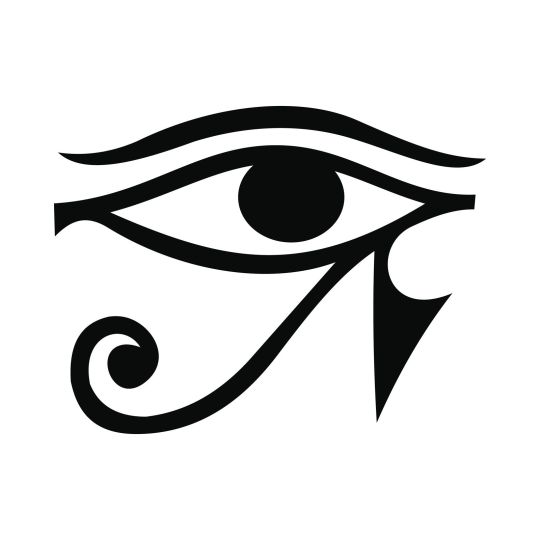
Just because you see a singular eye, does not make it a 3rd Eye by default.
This is actually the Eye of Ra & it's actually the right eye. It's paired (pair = 2) with the Eye of Heru which is the left Eye.
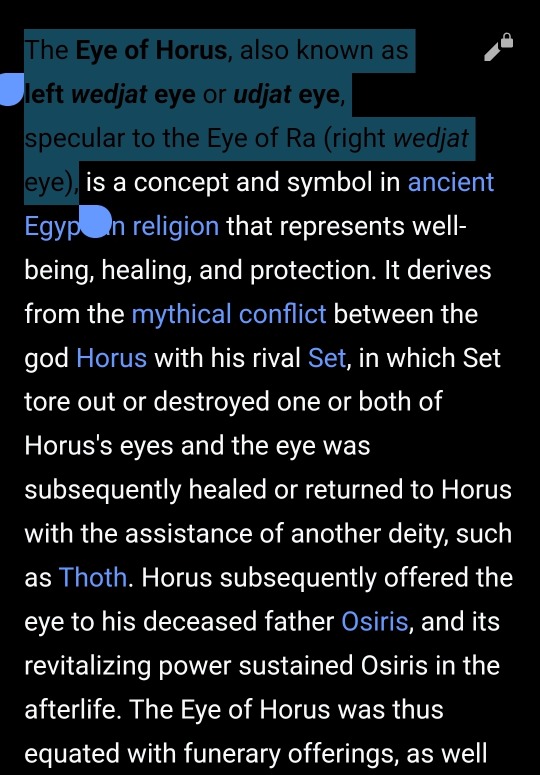
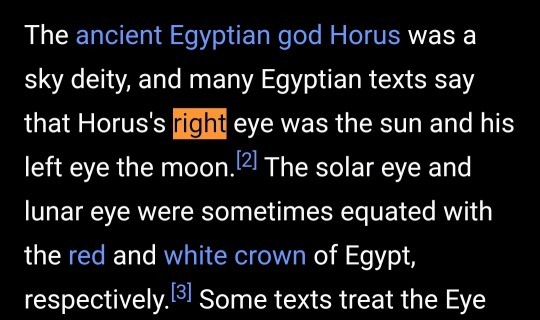
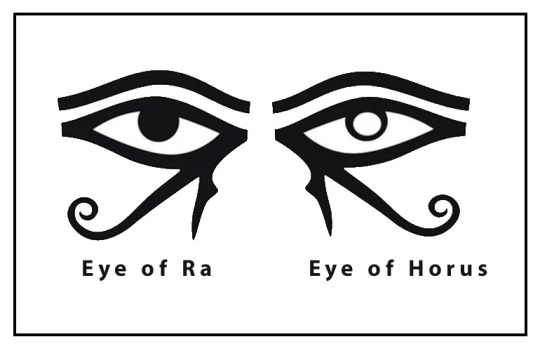
The Eyes are actually Falcon eyes, because both the deities to whom these eyes belong are sky deities, both represented by the falcon. That is because the falcon not only has excellent eyesight, but it soars far above any & everything else, which allowed them to see farther than any other living creature..
One eye represents divine insight, the other represents divine foresight.
As an African society, Ancient Kemet (Egypt) was a nature-based society.
This is important, because, like all African societies (ancient & modern), they did not deviate from the divine principles of nature. In fact, they revered, & was greatly inspired & empowered by it. This was greatly reflected in their symbology.
As such, they understood that there neither was, nor is, any creature in nature that possesses an odd number of eyes. Every creature has an amount of eyes that are divisible by 2.
The idea of 3 eyes in African culture & Spirituality would therefore be seen as unnatural.
So where does the idea of the 3rd Eye come from?
It comes from Hinduism & Buddhism.
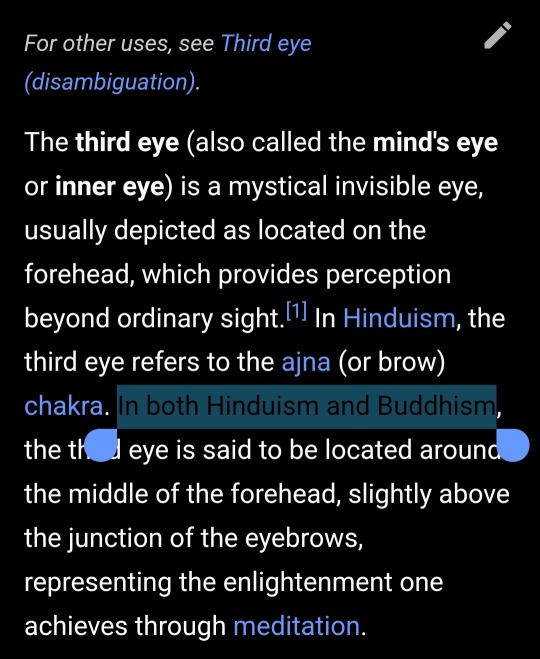
I've mentioned this a few times on my page, but whenever I see people (especially Black people, as that's essentially all I care about 🤷🏿♂️) talking about 3rd Eyes, & especially using the All-Seeing eye(s) as a visual representation of the 3rd Eye, I automatically know it's being done out of ignorance.
The reality is, most Black people don't know enough about Hindu beliefs, the nuances of their culture, nor their language to glean any real spiritual benefit from this concept. The proof of this lies in 2 points:
1) If they did, they wouldn't be mixing & blending it with African Spiritual concepts, &
2) They'd know that India is a very anti-African culture & society.
Not to mention, the meanings of the "Eye" in both cultures do not run congruent. Their meanings are not remotely similar.
So, how did Black folks get this notion of the 3rd Eye in the first place?
The answer is both complex & simple.
Hindus don't teach it, because A) they are very insular about their culture, & B) they wouldn't teach it to black people, because Hindus are extremely anti-Black.
I know Black folks like to make the false Pseudo claim that India & Africa are culturally linked, but nothing could be further from the truth (I've spoken many times on here about this; refer to my posts under "#Shango's Thoughts").
The simplest answer is, it came from white people.
Without going into great detail (at least, not at this time): The New Age Movements that were sparked by white people from Europe, as early as the 1930's.
These white people were seld proclaimed "mystics" that dabbled in all sorts of spiritual ideas, that made their way to the US when these same Crackas migrated to the US.
Many of them were affiliated with the Nazis, which is where they got their hatred of Black people. As an example of the correlation, that's why you see the swastika as the symbol of Nazism.
One such white "mystic" was Helena Blavastky:


This is the "mother" of New Age Spirituality (along with a few others of her ilk).
What's sad, is that alot of her ideas influenced everyone from Hitler to many of the Black spiritual movements in Amerikkka, from. The NOI, to 5% Nation of God's & Earth's, to the Nuwaubians, to the Moors, & a few others. Most of them don't even realize it, because they are not academic enough to make the connections.
I could go deeper into this now, but I won't (again, not at this time). The bottom line is, you can talk about how terrible these people are all you want, but the truth is, yall get all your "info" from them.
Suffice it to say, most Black people have been convinced to take part in ideas like Chakras & 3rd Eyes (& other related concepts, such as "Pineal glands"; again, not an African concept) because they've been influenced by white people.
Ideas like chakras, 3rd Eyes, Angel numbers, tarot cards, & a host of other concepts that have caught on in the past 50yrs are nothing but recycled racist notions. They have nothing to do with African culture or Spirituality.

Europe, France, Italty, Austria, Germany.... You haven't seen a Black face or name yet. 🙄
I cannot tell anyone not to hold fast to these ideas; you are free to do whatever you wish. But I can tell you one thing....
Whites & Hindus are laughing at us when we regurgitate these ideas.
I can also tell you why I do not adhere to them..... They are not from our Ancestors. They are from our enemies. Any religion that comes from your enemy (be it directly or indirectly) has no spiritual power for you. It is a weapon against you.
The proof of this, lies in the fact that none of these ideas have done NOTHING for us. That's because they're not meant to. It's like a white person buying a pick for their hair.
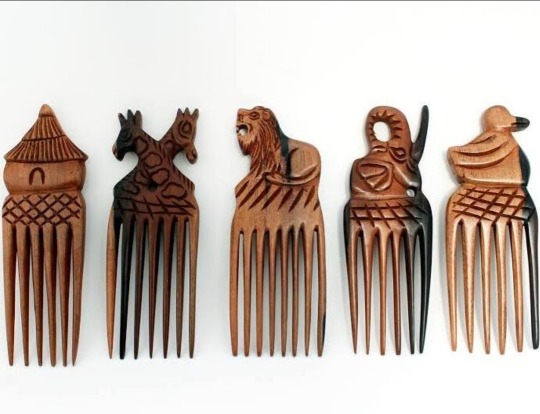
It was designed FOR the people it was designed BY.
I look to my Ancestors, & the traditions that they created. And 3rd Eyes & Chakras were not one of them.
Asé 🙏🏿
204 notes
·
View notes
Text
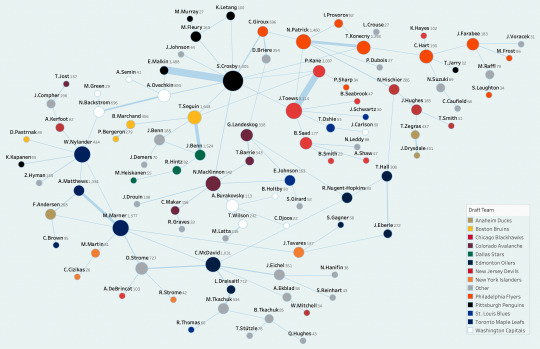
(nonsensical hrpf data exercise) degree centrality graphing & other archive insights
intro/prior work
hello 🙇♀️ i'm not sure this post will make any kind of sense at all, but i love analyzing ao3 data and i especially find it fascinating in the realm of sports/hrpf because of the amount of player- and team-related attributes that offer dimensionality to fandom analysis when examined in parallel with archive metrics. i've already kind of done hrpf overviews on two separate occasions over the past year or so, but my method of collection differed in each instance and also always gave me new things to chew on and potentially explore, such as expanding on the link between player talent and shippability and whether high-draft picks have more fic written for them on average.
i most recently examined player data based on aggregated relationship counts since 2022, but this was a limited snapshot meant to piece together recent ficdom trends (see top ships since 01/01/22) and not be representative of fandom overall. basically, things i want to visualize/talk about now are:
hockey is so widespread as a sports fandom because there are 32 teams in the league, which when compared to a community like f1 makes it difficult to succinctly summarize primary relationships for. there is no self-contained grid of 20 drivers that remains generally fixed within a season, where every move in/out of that "roster" is highly reported upon and instrumental to fandom makeup, but instead a more amorphous network of malleable rosters featuring high-variance cascading orders of character visibility; in short, the difference between the most and least popular driver in f1 fandom is not the same as the difference between sidney crosby and that one ahl lifer who was called up to your 4th line two months ago because your team is utterly decimated and gunning for bedard.
Still: because rosters are so malleable and trades happen with some amount of frequency, and because hockey is still an "insular" ecosystem in terms of geographic accessibility and junior-age development (for better or worse; mostly for worse, but that's neither here nor there), players intrinsically have a low degree of separation between one another, whether it be as teammates now or as friends growing up in the ohl, ntdp, etc. i therefore wanted to take that a step further and look at it through fic metrics especially: can we use a summary of ficdom's real, tangible output and visualize it through a similar network? (+ where and how does that network differ from player connections in practice?)
back to the impact of draft pick # and assessments of talent relative to popularity, i also wanted to look at the most "successful" ships in ficdom from this network and evaluate the different distributions and impacts of their respective attributes. are certain player positions more popular? which nationalities are the most commonly shipped?
etc. But let's just get into it.
process
getting any kind of information from a 60%-locked fandom on ao3 is a nightmare and introduces a myriad of data-collecting limitations, so i do feel it important to disclaim that what i present in this post functions more in the realm of Approximate Interpretation and Potential Correlation than any actual 100% objective representation of fandom metrics.
a perceived limitation i have with character tagging metrics on ao3 is that they don't exactly reflect shippability; that is, if q.hughes is tagged as a character in a n.hischier/j.hughes fic, it gets attributed to his character tag but doesn't actually say anything about how many Relationship Fics exist for him on a whole. my best solution for this was essentially uncovering most of a player's relationships and summing their individual fic counts to create an approximate # of "relationship fics" for each player. so any kind of shippability graph going forward will use that metric.
i used ao3's relationship tag search and filtered by canonical in the men's hockey rpf fandom and only pulled relationship* fics ("/" instead of "&") with a min. of 20 works. ao3's counts are... Not the most accurate, so my filtering may have fudged some things around or missed a few pairings on the cusp, which again is why all the visuals here are not meant to show Everything in the most exact manner but function more so as a "general overview" of ficdom. although i did doublecheck the ship counts so the numbers themselves are accurate as of time of collection.
(*i excluded wag ships, reader ships, threesomes to make my life easier although i know this affects numbers for certain players, hc/gm ships, and any otherwise non-NHL Player ship. for ex., this eliminated anna kasterova/evgeni malkin, tyler brown/tyler seguin, and kyle dubas/william nylander, just to name a few)
all ship data was collected march 16, 2023.
PART 1. SC87 ship networking
when i first began this exercise i tried graphing ships for all the first-overall picks from 2003-2022 because i wanted to get an overarching sense of their connections. however, doing so made me realize that sidney crosby was by and far the most-connected node in the graph (and basically all hrpf in general) with a degree of 11, and that he was centering one huge component to which only two ships failed to connect (op/kj and slaf/xhekaj). basically:
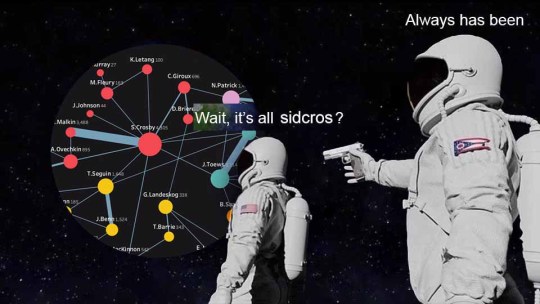
so then i was like, right! let me instead use sidney crosby as my sole starting node, map out all ships with 20+ works from him specifically, take the players he connects to and map out their corresponding ships (excluding sid) and just keep iterating until i basically reach a final child node. through this, i yielded 112 ships and 98 unique players, with my final connecting node coming 9 degrees of separation away through brady tkachuk ↔ tim stützle/quinn hughes. unfortunately i can't actually host this little code snippet anywhere lol but i also wrote an input to check the pathways between any two players which was kind of fun:
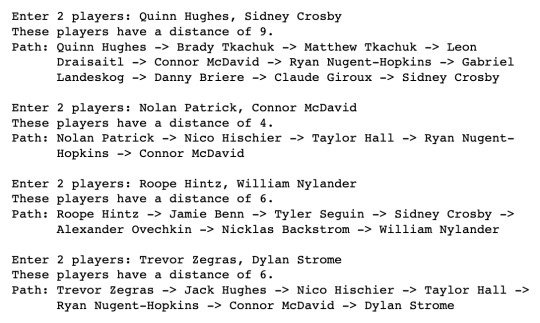
here is the actual network graph with colors from automatically generated clustering, which doesn't really mean much but i thought was one nice way of presenting it. the edge width refers to the sum of fics for each ship and the node size refers to the degree, or number of ships, for each player.
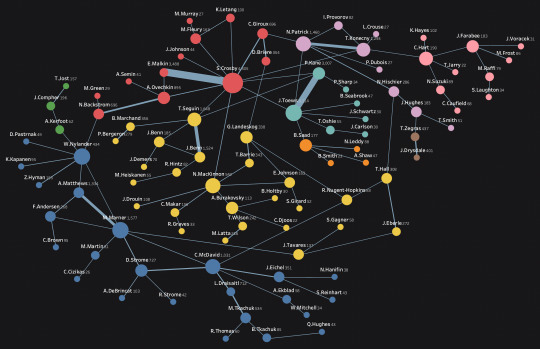
i then also joined my player set with a dataset that included draft year, drafted team, position, etc... and through that color-coded the graph with the team each player was originally drafted to (i always struggle between using current team and draft team because which one matters more is super contextual, but... using draft team made my life easier this time so i hope it's still interesting.) here i only included colors for 13 teams that had 3+ players each:

→ [full-size graph]
we can do a bit more analysis based on this specific sidcros network, like which players are the "most-shipped" or overviewing cross-team shipping tendencies:
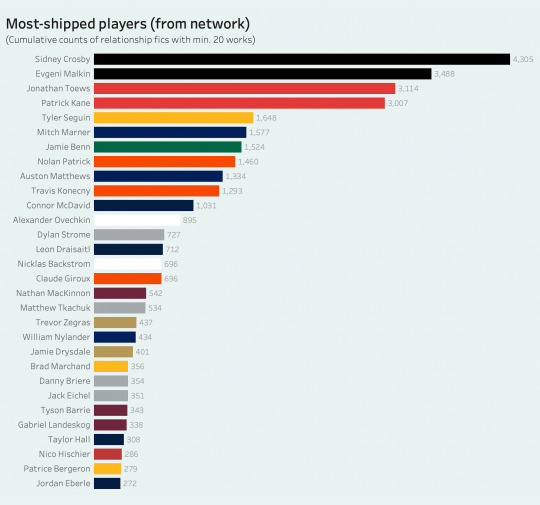
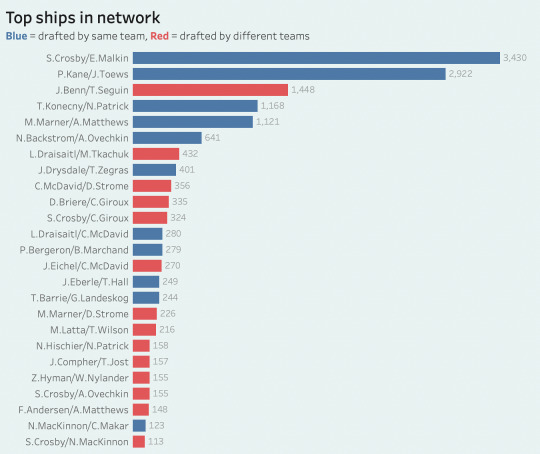
but! of course, not ALL big hrpf ships lead back to sc87. using him as a central node essentially just helped me filter out excess "noise" when searching for relationship tags on ao3, because now i could exclude anyone connected to him at all (note: the relationship fics from my set equaled upward of 19,000 works, accounting for 60.4% of the entire men's hockey rpf archive) and hit other significant tags more efficiently.
through this method, i singled out a new set of 76 ships and 134 unique players (notice the significant decrease in overlap), which i then combined with my sid ships to create one massive set of Hockey Ships With Over 20+ Works On Ao3 that i could analyze holistically. no idea if this makes any sense but bear with me:
PART 2. general ship insights
i won't bore people with endlessly listing out ship rankings but here's the previous top chart with the new ships slotted in:
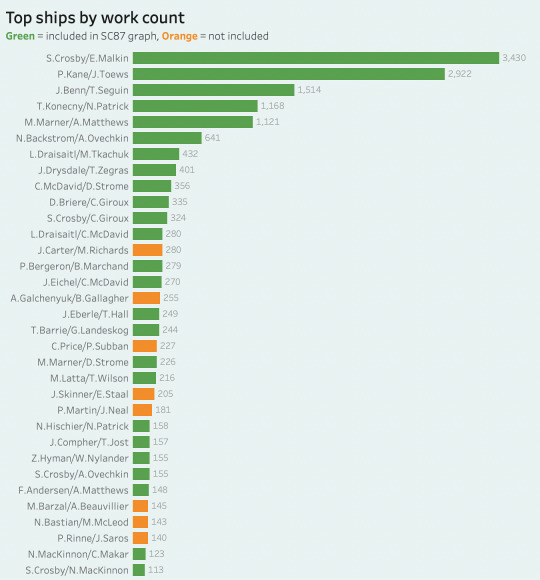
now for some overall player analysis!
first i wanted to look at how attributes like draft round, nationality, and position (F/D/G) are represented in the player set.
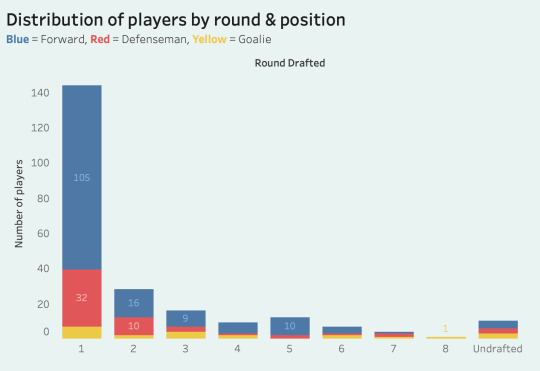
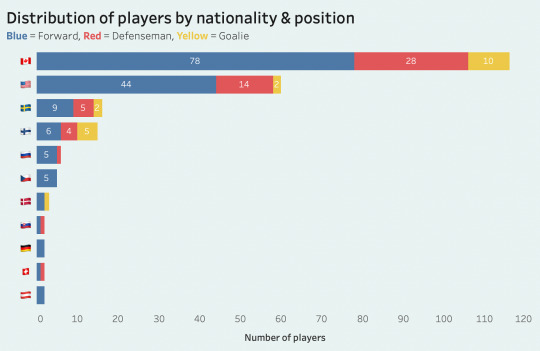
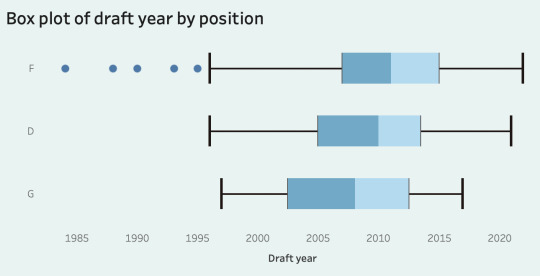
the nationality distribution is pretty close to all active nhl players this season, so there aren't major disparities there. however, the vast majority of players 1) were drafted in the first round and 2) are mostly forwards, with the forwards also seemingly reflecting the general philosophy of faster development/higher recent-round representation. we can take this overview a step further and actually examine the fic averages for each characteristic as a proxy for measuring shippability/ficdom popularity.
first, i scatterplotted all players by their draft pick and number of fic to (try and) show the heavy skew toward top picks (inspired by the gar draft pick value curve and other similar plots). this is... well, limited in many ways, and if i had an actually adequately large dataset i could specifically plot averages per distinct pick number and try to present something there, but the problem is that a lot of these later pick numbers only have like one player so there's way too much variance LOL.
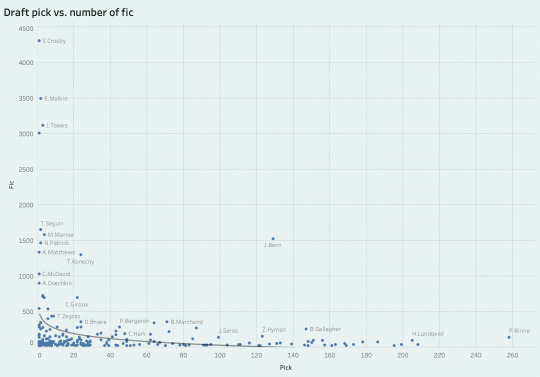
but just for the sake of this exercise i excluded j.benn as an outlier and grouped fic averages by round (left below). again, noting the sample sizes, let's just say that first rounders on average seem to have the most fic written about them, even if it's not a particularly shocking insight. we can also try creating a histogram for "shippability" by draft year, binning here for every 2 years, to see which draft years appear to have had the most success (right below). note the peaks around 2005 and 2015, aka the sc87 and cm97 ~Generational Years~ 🤔
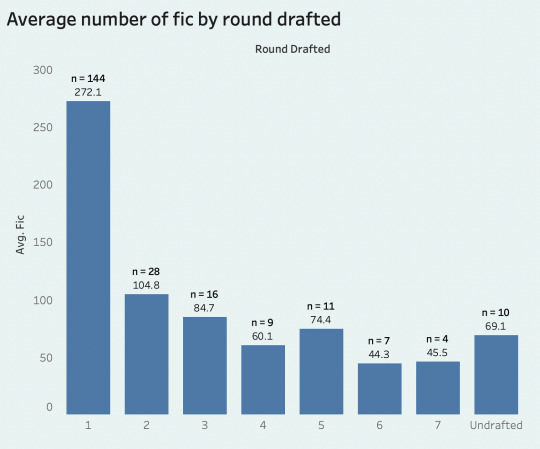
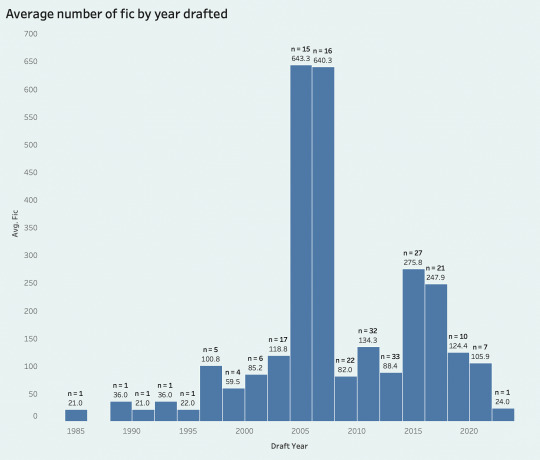
i've also been interested in figuring out which positions are commonly preferred—since centers are so often the faces of a franchise and are essentially the most sought-after position, and since goalies occupy a positionally static role/are less oriented toward contact (and the presumed homoeroticness thereof) in the way skaters are, is that reflected in the fic metrics as well? turns out: yes.
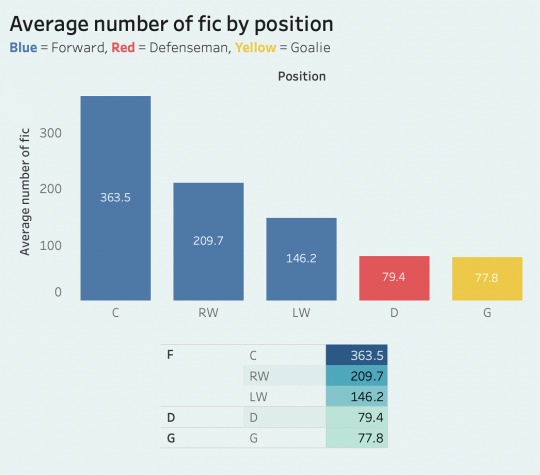
some ship analysis
learning more about player data in a vacuum is fun, but we also have all of this relationship data that lets us examine how different characteristics interact with each other, which is meaningful as well! for example, we know that forwards are heavily represented in the dataset, but is center4center the most common combination? or is there love for a franchise center and his beloved winger or the team's dependable 1d?
(fought for my life trying to figure out how to map this properly so please accept a horrible bar chart instead) as it turns out, the most common combination is centers/wingers, followed afterward by centers/centers. i don't know whether this really means much to me because i'd like to dissect the combos even further (is C/C more often 1C 2C or cross-team rivalry 1C shipping? are C/W usually linemates? etc.) but 🤷♀️ here's a graph.
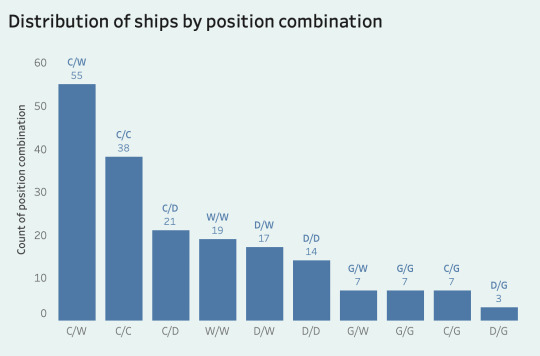
i also distributed ships by their nationality combination, displaying to the surprise of no one a heavy preference (a whopping 66.4%!) for north american-exclusive shipping. i also thought stacking by "draft year" (= averaging the draft year between both players for each ship) offered some interesting insight into usa4usa shipping having slightly younger representation. also i do think usa/germany being singlehandedly driven up this chart by one family is remarkable and hilarious LOL.
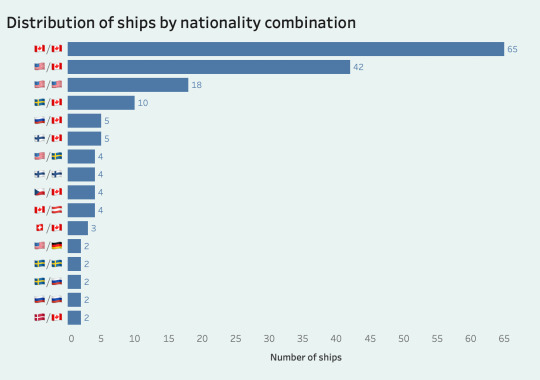
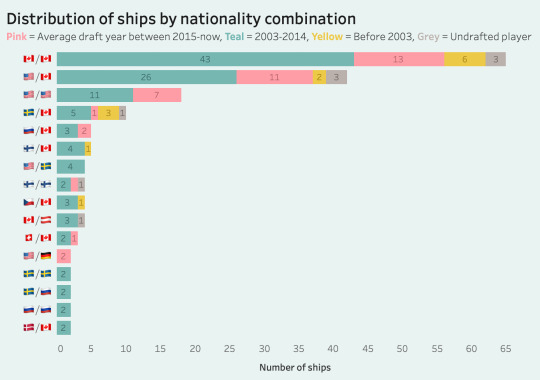
also in the realm of draft year analysis, i wanted to look at draft year differences and whether fandom preferences seem to lie by way of same-age-ish pairings and In-Class Bicycling so to speak. graphing ships by these differences spanned a range of 20 years, with the oldest "age" (draft) difference being 20 years between zdeno chara and charlie mcavoy. overall, of 175 ships with a drafted player, 60.5% were drafted within 2 years of each other (18.2% in the same draft), and only 5% had a draft difference of 10 or more years.
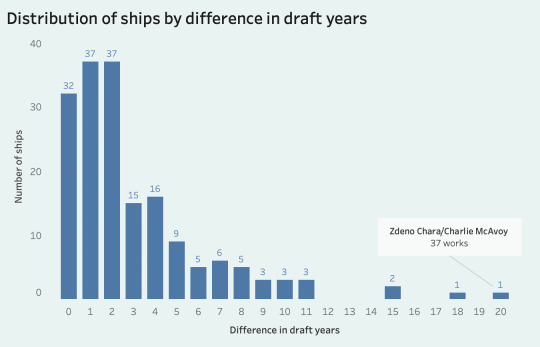
then, of those 32 ships drafted within the same year, i distributed their counts by year to see which draft classes featured the biggest in-class clusters, leading us again to the Famed Class of 2015:
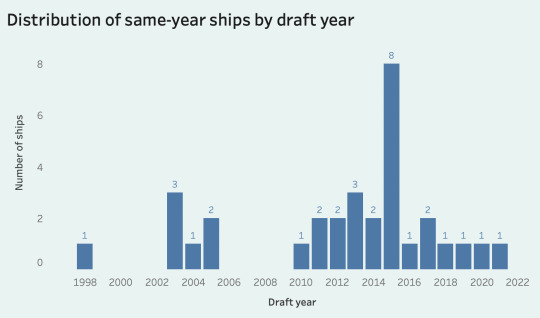
closing thoughts
i'll stop here :saluting_face: something else i had on the agenda that i don't really know how to adequately explore with this dataset is basically stanley cup champion stuff, e.g. looking at players and ships and fic counts from winning teams and how/whether a sort of "winning bias" has been trending down as of late (see the relative success of ships from teams like phi/ana compared to tbl/stl)—temporal data is so particular and difficult to wrangle with ao3 though so i'll have to let this one percolate a little bit.
finally, another thing (!) that i love examining is captaincy and how it often helps inform shippability; C/A/guyswithletters shipping obviously generously overlaps with being drafted early, high-impact players, some positional stuff like Young Star Center having the role foisted onto him, etc. and many of these aspects are immediately identifiable in top ships like 8771, 1634, 1386... just to name a few obvious ones. unfortch i don't really have the time or space to look at that here but it's something i'm still interested in maybe expanding on, and i also never ended up collecting actual skater *performance* data which would be super fun to eventually get to, e.g. mapping ficdom output to not just background identifiers like draft year/pick but also 1) actual tangible evaluations of player goals/points/(salary?!?)/etc. and 2) some dimension of draft outperformance/underperformance, which is pertinent for scenarios like late-round picks who have defied career expectations (see outlier jbenn having a shit ton of lifetime fic) AND early-round picks whose trajectories have not panned out as expected for whatever reason; often the ~tragic~ frustration of being a bust actually invites more narrative focus and scrutiny, but at the same time ficdom trends have pointed themselves to being attracted to many historic, talented, generational, and so on players, who more often than not are also winners, which potentially posits a need for some sustained line of access/visibility to high-expectation players significantly before they're regarded as "busts" in order to organically grow and generate initial interest that can survive the renewed reality of their situation. but who knows
again, i don't know whether any of this even makes sense or is interesting to literally anyone at all, but i personally enjoyed just dicking around graphing shit and getting to join a ton of tables together for absolutely no reason lol. that's all!
478 notes
·
View notes
Text
I had wrote a post a month ago about q!Bad's role in the narrative, and I want to revisit it. (Full disclaimer, this is just Not Real. I'm analyzing mcrp like a conventional narrative for fun. There are no actual "roles": every character is a main character.)
The analysis had come after months of Bad being a large part of lore, but not a major player. The mysteries and missions he went on were never his own. He was known as a strong fighter, until the codes directed their attention at Etoiles. He was second place in the election. Characters would get kidnapped or given enigmas, and q!Bad always played support. At the time, we were all impatient that he had no special Federation plotline after months of arriving on the island (no shade to the admins here - we're not talking meta).
But that brings us to present day, and suddenly Bad has become a very proactive character. His kids are gone, he has a motive, and suddenly he's the one changing the story. In literature, there is the trope of a "passive character": one that is affected by the story, one who is led by the plot. q!Bad is certainly not this character anymore. Instead of letting the Federation set the scene, he takes a page out of their book. He kidnaps one of theirs. Instead of theorizing about a spy like he did months ago, he's now actively feeding information to others to find a puppet. His skin is deteriorating due to his self-inflicted punishment. There has been a spike in posts and tweets about how Bad did [x] to [y] character. And that's what I'm talking about: Bad is moving his own plot. He is now what others react to.
And still. This is not Federation-designed. This is all on his hands. It's very rare that QSMP characters are so untouched by the Federation. Many characters are punished by the Federation. Many characters discover a storyline tied to the Federation. Many characters are experiments of the Federation. Bad has none of this. And I'm not at all saying this is unique to Bad, or that Bad is the only one who's actively moving his own plot, I just think that this provides a really interesting insight to Bad's character. (Again: this is a NON-META analysis! Every creator writes/helps writes their own storylines).
He is an extremely insular character. The Federation only investigated him when he made himself too hard to ignore. Aside from that? They do nothing. Secret shulker boxes? They were tied to Cellbit's lore. The tickets? Everyone ended up getting one. Imprisonment? Okay, but only for 15 minutes. He remembers his backstory, he remembers his life before the island. While the Federation could have interfered anytime in his lifetime, he's over 11,000 years old. His core trauma stems from (presumably) Atlantis. None of that is connected at all to the Federation. Drop q!Bad in another server, and nothing about his backstory changes. The more I think about it, the more odd it strikes me that Bad is an original islander, and he is so untouched by the Federation.
So this brings us to Bad's biggest Federation tie, which are the emails from before the server started. And even then, it implies that Bad is not a worker or an experiment, but a guest. And a special one, at that. It's very hard to take the emails as any definitive evidence, but what stands out to me is this quote:
"We are seeking quotes for the purchase of 1393 muffins to satisfy the extra demand of our special guest."
Each word here is the Federation catering to the special guest. The Federation has been given a demand, and they are fulfilling it. They are the reactionary party here. They are not the ones pulling the strings. They are not penning this story. It is the guest who is doing so, and, in theory, q!Bad.
So we come back to the same conclusion. Perhaps this has always been Bad's "role" - the special guest of Quesadilla Island. Invited to sit at the table, but not to give a speech. Perhaps he just never is going to get that Federation-tailored storyline because he is not meant to. His story started in Atlantis and he will always be pushing forward his own already-established plot. The Federation is just another antagonist in an already long, long tale. Everything he does is self-inflicted. Doesn't it make sense if this applies to the narrative as well?
176 notes
·
View notes
Text
I really think it'd be fun if Team Issylra ran into Essek. (For the record, since I know how this sounds coming from me, if Team Wildemount were going to run into any members of the Nein, I thought the divine casters corner would've been most fun to encounter in Molaesmyr.)
For real though, I just think that they'd benefit a lot from someone with a very complicated relationship to religion, not least an insular one tied into hometown politics, albeit on a larger scale, with experience with personal dissent. Also, obviously, Ashton's continued dunamancy weirdness. Plus we might get a little more insight from a wizard who's at least somewhat knowledgeable about the Solstice. (Sorry, Prism, ily anyway!)
And last but absolutely not least, exhibit A on "Never start wondering if Ludinus Da'leth might be making some points. Not even once."
#critical role#cr spoilers#essek thelyss#listen I just think we need to keep sight of what's important#and what's important is 'never give fascists an inch on ANY subject no matter how charismatic or compelling they may be'
121 notes
·
View notes
Note
are there any summaries about what actually happened in the art pyramid or althar rps? the vns that glip posted are so incoherent and make it seem like they spent the entire time yelling at people. is it a ploy to try and lure people who want to know what happened into the discord?
So the thing is, I might be a good source for the stuff the people in Flora have done but am a terrible source for what happens in the actual comic, especially the recent content and the insular 24h role plays.
I can tell you anecdotal things I heard like how one player apparently got their character killed off as a punishment for falling asleep during a long role play session, likely because these roleplay sessions took place during the kids fucking AP exams.
So I want to say you're likely correct on both fronts, it's a ploy to get people into the Discord to figure out what is going on and Glip probably did actually spend the entire time yelling at people.
The actual role plays themselves are probably one of the things the general public has the least amount of insight into, but there are many horror stories.
I should probably check and see if we have any of the roleplays in our logs.
16 notes
·
View notes
Text
Hybrid Class Review: Investigator part 3

(art by LaminIllustration on DeviantArt)
Archetypes
The investigator boasts an interesting set of archetypes, so let’s dive right in! I tend to divide these archetypes into four categories.
Perhaps the first group I’d like to go over are those investigators that are still expressly detectives while dropping the alchemy in favor of other specializations. Perhaps none is more iconic here than the sleuth, which feels like it was made specifically to be a non-specialized detective that drops alchemy entirely in favor of having a pool of luck to help them through the day. Meanwhile, the Jinyiwe focuses on divine mandate and gains spells from such a source, while the Psychic Detective instead uses psychic magic and their sensitivity to gain clues and insights as well as defend themselves. Scavengers also exist which use quasi-magical gadgets instead of alchemical potions, and the Questioner augments their interviews with bardic magic. Additionally, Spiritualists (the archetype, not the class) channel the spirits of the dead to gain answers, while Malice Binders turn witchcraft lore against the wicked.
Of course, some investigators keep the alchemy while still having their own specializations as detectives. Bonded Investigators make use of a familiar ally, for example, while Steel Hounds are never without their trusty firearms. Ciphers investigate by being supernaturally unnoticeable by those that would stop them, while Cult Hunters and Infiltrators both finds ways to find and put a stop to secret societies and insular groups. Others specialize in gleaning secrets from the dead, such as Gravediggers and Dread Investigators, though their methods differ. Empiricists use unfailing logic to defeat deception and trickery, while Profilers use psychological profiles to determine suspects. Forensic Physicians are trained to glean secrets from the dead in a more mundane manner, while Skeptics use their keen senses and knowledge of parlor tricks to reveal fake hauntings and deal with the real ones. Meanwhile, Guardians of Immortaility, Lepidstadt Inspectors, and Ruthless Agents are known for their dogged pursuit of their goals. Finally, Hallucinists use mind-altering substances to reveal the truth, while Lamplighters reveal with alchemical light sources.
Of course, there are some so-called “investigators” that actually deserve investigation of their own, notably the Conspirators, who hide their activities and deceive others, and the Masterminds, master manipulators that can coach their allies on plans in advance.
While plenty of investigator characters may not actually be professional detectives, some of these archetypes are expressly not that while still using their brilliant intellect. Some are scholars and archaeological collectors, such as Antiquarians, while others study mysterious beasts like Cryptid Scholars. Meanwhile, Cartographers and Star Watcher, who study their charts for very different effects, are also a possibility. Engineers create inspired devices, while Holomog Demolitionists destroy with shocking precision and cunning. Utterly ignored but shockingly competent is the Majordomo, who serves dutifully and organizes those under them to great effect, while Tekritanin Arbiters put their brilliant minds to resolving conflict. Natural Philosophers meanwhile study nature directly, while Portal Seekers study the realms beyond the natural. Finally, Reckless Epicureans test their experimental formulae on themselves, while Toxin Codexers specialize in understanding poisons even beyond the standard investigator’s knowledge.
As you can see, these archetypes come in all shapes and sizes, but all in the end fall back on the core theme of the investigator, which is finding the truth. That truth may be the mysteries of a crime or misdeed, or they may be more esoteric such as scientific advancement, occult mysteries, and beyond.
That does it for today, but tomorrow I’ll share some thoughts on the class as a whole.
9 notes
·
View notes
Text
I feel a little bit vindicated in my unease towards some of the so called activist groups too after dipping my toes into a few organisations - there's definitely those who are looking for opportunities to sell politics back to you rather than actively invest time to the causes they claim to support
that's not to say you should always be cynical or that you need to find a perfect island of group politics, I found some of the organisations that outwardly seemed meandering and unkempt had stronger overall tactics and insight into local government, as opposed to others that maintain an "active" face but spend a lot of time spinning their wheels without going anywhere.
I find my preferred organisations do reach out to involve other groups too, rather than acting as insular cults of personality.
I think of them as "recruiters", much in the way of religious organisations or bogus charities. They tend to read off a script, seem hard pressed to sell you something (expensive conference tickets or a subscription of some kind) and apart from doing a lot of talking and trying to make their presence known, don't really seem that engaged to whatever issue they claim to represent, as much as a more nebulous idea of an ideology.
In retrospect it feels even more uncomfortable to realise, the uni student who needled me about if being queer impacts my support for the working class was using a tactic we usually see on the far right:
getting someone impassioned by making them argue, then bringing them into the fold as an outlet.
They like to get you talking, but not about any particular next steps, just more broad discussion they can use to sell you on themselves.
That being said, I have the luxury to be choosey because I both have time and access to engage a variety of people. I don't think everyone involved in these recruiter groups means harm, it might be all they have access to, in which case using the space and resources available is more important.
I'm also not going to completely write off the merit of having folks out there willing to do the hard sell to those who haven't been exposed to Marx and socialism and all the rest before.
Personally, I will say that being preached to at length with the intent to drain my wallet, sitting there thinking "isn't there something better we could be doing right now?" as my only exposure, didn't exactly inspire me to become more active or engaged.
This is exactly what is meant by the insistence that your best bet is to look to those most involved, indigenous lead groups for indigenous causes, Arab lead groups for Arab causes, queer lead groups for queer causes and groups that are expansive and diverse for bigger causes - you might actually find people with strong ideas of where we need to push next.
I don't think we should entirely discount anyone willing to step forward and speak out, but we should be wary that something being branded as "activist" doesn't strictly make it so in any situation. It's not a matter of waiting to be told what we need to do but seeking ourselves where we could be most effective.
It makes me a little sad to think these younger people might've felt stuck in the same way, but were convinced to stay with one group and become recruiters rather than exploring their options.
15 notes
·
View notes
Note
Hello LL, a former skeptic here who has been over on the right side of things for a while. I wanted to give a little insight into the skeptics' mind, based on lived experience. In short, you're 100% correct that it's all projection, especially when they talk about BC's "struggle" and "depression" because it's their internal struggles they are describing. Luckily I'm out the other side, sought help and now feeling better. It doesn't excuse the terrible behavior - of course - but it certainly comes from a very dark, toxic, and insular place.
Glad to see you saw the destructiveness of the "skeptics" in both an internal way and external one as well.
When you look at blogs like Aeltri, Gator and Msclaritea, we see an immense amount of mistrust, emptiness and rage in every post.
Basically they all are very angry people.
And this fury is often a product of their own immediate circumstance (relationship/marital problems, financial/job troubles, mental/ physical health concerns) but they aren't equipped to handle these issues in their own life. A lot of them are fairly isolated individuals.
So they transfer these personal frustrations onto safely distant "targets" - like a celebrity's private life. Suddenly THEY have all the answers to solve this celebrity's "problems"!
It's all a delusion (of course, these people don't know the celebrity, don't have any special inside knowledge, don't have any influence on the celebrity) but they FEEL like they can now control this fantasy world of theirs, at least.
So in this "universe" THEY are the ones taking action, THEY are now important with all sorts of "sources" and "answers "!
By making outlandish claims and accusations, they also gain attention and if the attention fades, they come up with NEW INFO that draws attention back to them and refreshes their feelings of control.
It's a sad cycle that doesn't help them face their very real issues in their own lives and brings disruption to a fandom that just wants to enjoy a talented and generous person.
7 notes
·
View notes
Text
maurice (the book, the movie which is pretty close to the book all things considered, etc) has a lot of problems like fundamentally it's definitely a product of its time and of the man (e.m forster) who wrote it and the state of the british empire and culture in his lifetime, his biases and failings of his ideology are clear when reading his writing.
but there really is something so endlessly fascinating to me about it Because of that, if that makes sense, because it really does capture the mindset of an Edwardian era middle class white British man and all that entails, and how the quintessential version of that man might react when faced with his desire for men and only men, and the ways in which that might very realistically be experienced and expressed.
this is especially notable because he wrote it privately, knowing he couldn't publish it until after he died or until some distant day when british culture could cope with a book like that, and so many of the characters are inspired by himself and the other white British gay men he knew from all walks of life and it's sort of just written for them and so it feels very personal and insightful to that entire mindset and experience of the time. like it functions as such an excellent snapshot of that time and place and group of people and it's simultaneously a work of complete fantasy and the overwhelming whiteness and britishness of it and the very premise (as well as the solution offered by it) is something entirely a product of itself, if that makes sense, like this book only could have been written in these conditions and in this context.
analysing it feels like placing an entire worldview and experience in a fish tank and spinning it around - noticing what it says and what it doesn't, what is left out, how events are framed, the thesis of the story, the entire thing is fascinating no matter what angle you take and it's so self indulgent and confessional it's just the whole thing laid bare in a way that is really rare imo
especially w the emphasis on class in particular as a defining thing in the story, like maurice is fundamentally an exploration of class and forster tries to grapple with these things clumsily and using the only language and approach he knows how to because of the circumstances of his own life, and you can see the limits of his understanding of class dynamics through the book, the fault lines in his thinking and his contradictory opinions on working class people and old money gentry and the middle class and all of that. like it's Not a marxist look at class whatsoever but I always find things like that really fascinating because they're trying to grapple with class consciousness and they're so close and yet so far and in maurice it's wrapped up in anxieties about white male masculinity and british propriety and the specific strange brand of late victoria /edwardian period misogyny and you get the benefits and consequences of empire and british racism laid bare on a kind of deeply insular, commonplace level without ever once mentioning let alone featuring a nonwhite person at all. like the Lack of mention of these things feeds into the fantasy aspect of it and the self indulgence of it.
bc at it's core it's just all so loud and it's an edwardian era white cis gay affluent british mans fantasy of his ideal man and ideal relationship and that fantasy of escaping class society to some """"primitive"""" state where they can just Be but there's no room for that within the british empire and it's so so so so indulgent in that way and so revealing. theres so much to unpack and so much that still feels relevant to the experience of white middle class gay people in the imperial core today and their mindset and anxieties and the whole thing is just endlessly interesting to me in a "I want to study this in a laboratory" way. like it's the kind of book that makes me want to do a marxist analysis of the entire ideology on display here and how it's still relevant to current class anxieties and fantasies of escapism within certain communities - like the cottagecore thing - and pick it apart and examine its innards because it reveals so much at just a rudimentary level and whenever I reread it there's something new I think about and come away with
#its one of the books i always go back to like i know the whole thing nearly by heart at this point#because its just endlessly fascinating to dissect and every time i listen to it/read it i come away with something different#and its a pretty short book so its easy to do#(edited the post to break up the text a bit for readability)
77 notes
·
View notes
Text
truly do not understand why such a common genre of post on here is "[bigots] love saying that [whatever fresh new angle of horrifyingly violent rhetoric just got coined in insular hateful communities, going into details to give you new insight on how to hate yourself and spreading its rhetoric and points to a much wider audience] but that makes us look soooo cool and badass actually haha" like.
the perfect companion to the "quote tweet: nuh huh / original tweet: the most hateful and violent tweet youve ever seen" genre of twitter screenshots that people love on this website.
4 notes
·
View notes
Text
The New Cue #273 March 27: James Ford
James Ford gave an interview for The New Cue which was published earlier today. Here are the parts where he mentions Alex or Arctic Monkeys:
"How naturally did it come writing lyrics?
I’m definitely noticed working with a lot of great lyricists - I notice people like Alex Turner will be constantly thinking about lyrics and taking snippets from people’s conversations and jotting stuff down in his notepad. I definitely don’t think in those terms, a lot of the time I’m very much into melody and chords and feel, but I felt like I opened a little extra door in my brain when I suddenly started thinking about lyrics, seeing little things and thinking, ‘Oh, I’m gonna have that.’
(...)
The defining relationship in your production career is your work with Arctic Monkeys, which goes all the way back to their second record Favourite Worst Nightmare. Can you give me an insight into how a modern Arctic Monkeys record is made, I think a lot of people find their dynamic quite intriguing.
Yeah, that’s the thing, even within one band, it changes every record. With the most recent record, Alex is getting very into recording stuff himself. He’s a polymath at the best of times, he plays everything, he’s into the sonics of it and he’s obviously writing the songs for the most part. He does pretty great demos on this thing called a Tascam 38-8, it’s like an eight-track tape machine and it’s got a real vibey sound. He’ll come in with pretty well-formed ideas at this point, it definitely used to be less formed when they came in, although they’ve always been pretty well organised.
I seem to remember the writing process for The Car was quite long, he went to and fro with a few different direct directions. He definitely did a fair amount of writing, he had his own studio in London somewhere and Jamie [Cook, guitarist] and the band were coming in and out, jamming, then he’d do four or five different versions of the same song with different tempos and he’d played some of them to me and I’d be like, ‘Oh, that one’s sounding great.’ Then eventually, he came in and did some stuff in here, where we’d get his demos up, and maybe do some structural stuff and think about how we would actually record it. The last record was in a pandemic still so we couldn’t go abroad to a studio that we’ve been to quite a lot. We went to this country house in Suffolk, which involved pulling my studio apart and renting loads of stuff. It was quite a big technical thing. I just remember doing loads of wiring, plugging in the studio, getting it to work. The recording set-up was quite slapdash in a lot of ways but it ended up being a really lovely experience out there and we got it sounding really good after a bit of luck and a bit of hard work. After that, we brought it back here and me and Al did the string arrangements, pushing notes around on the screen. Then we went and got the string stuff done with this girl called Bridget Samuels who’s brilliant, she translated it into all the dots and that. Then I mixed it in this room.
It sounds like quite an insular process.
Yeah, it’s funny, I’ve known them so long now. I’ve been working with quite a lot of new bands and you get this energy and respect or something that you have in a new relationship and it counts for quite a lot. People will try stuff out that they wouldn’t normally try. But with the Monkeys, it’s a totally different thing where there’s this deep trust that we’ve grown up together.
So there’s a shorthand?
Yeah, that’s the thing. Me and Alex, our music tastes have grown together, I’ve introduced him and he’s introduced me to so much different music and there’s so much that you don’t even have to bother explaining. But sometimes that’s good and bad. I do often think it would be interesting to see what they did with someone else at this point, not that I’d really want them to, but I think that maybe they should, or it might be like a marriage where it just wouldn’t work. It’s a funny thing, but I still definitely try and push him as hard as I can. I’m aware I don’t want him to settle into a comfort zone and it just become boring, you’re trying to keep finding ways to move forward and do new things.
Which record that you’ve been involved with across your career that you think is underrated?
Maybe just because we’ve been talking about Alex, but I remember really liking this one called Belladonna Of Sadness by Alexandra Savior that me and Al did. I remember really enjoying making that and thinking it sounded great, but no-one ever really heard it. There’s lots of ones that you think are gonna do great but don’t, then ones that you’re not so keen on that suddenly have this life of their own."
27 notes
·
View notes
Text

Resenha "As portas da percepção - Aldous Huxley"
Por Cecilia Café-Mendes
O livro nos convida a refletir sobre como o mundo nos permite uma infinidade de interpretações. E que nós temos essa capacidade infinita dentro de nós. Entretanto, por mais que desejemos, nunca, de fato, veremos o mundo pelos olhos dos outros.
“Sensações, sentimentos, insights, fantasias – tudo isso são coisas privadas e, a não ser através de símbolos, e indiretamente, não podem ser transmitidas. (…) Da família à nação, cada grupo humano é uma sociedade de universos insulares”.
Aldous Huxley
A percepção é um processo ativo e em constante construção, advinda das nossas experiências. Ela depende tanto do objeto a ser observado quanto do observador. O modo como observamos o mundo é contaminado pelo nosso conhecimento prévio, pelo nosso aprendizado. Entendemos a realidade como uma consequência da percepção mas, uma vez que esse sentido está imbuído de multiplicidades culturais, sociais, éticas, não podemos definir o que seria realidade absoluta. Cada um, de fato, tem a sua.
Aldous Huxley em seu livro As portas da percepção relata a sua experiência sob a influência de uma droga muito comum nas décadas de 1940 e 1960, a mescalina. Huxley, conhecidamente um entusiasta de experiências místicas, busca na mescalina uma forma de entrar em contato com esse universo. Já tendo se utilizado de terapias alternativas para atender os seus anseios transcendentais, ao chegar aos EUA, no final da década de 1930, fica sabendo do uso do cacto peiote em cerimônias da Igreja Nativa americana, no Novo México. A mescalina, um alucinógeno, é a principal substância encontrada nesse cacto.
Nesse curto porém denso ensaio, Huxley baseia-se em teorias de estudiosos como as do filósofo Charlie Dunbar Broad e problematiza sua experiência sob a ação da mescalina. Para eles, o cérebro é uma grande válvula reguladora. Nossos sentidos são bombardeados por informações a todo instante e, para nos proteger desse grande aporte de dados, o sistema nervoso elimina tudo aquilo que for inútil em determinada situação. Assim, temos tanto memória quanto sensações seletivas.
Em uma narrativa fluida, Huxley descreve a sua visão de mundo após interferir nessa seletividade a qual o cérebro em seu estado basal está acostumado a funcionar. Apesar de sua inicial decepção com as sensações – ele achava que teria visões e alucinações semelhantes ao estado de um esquizofrênico – ele percebe que passa a dedicar mais tempo da sua atenção a detalhes que antes lhe passariam despercebidos, como, por exemplo, o contorno de um vaso, a cor das pétalas de flores e o incômodo que, de certa forma, aquela combinação lhe causava. Entretanto, nada disso era mais importante para ele do que a reflexão que essa observação lhe causou: o milagre da existência, sem julgamentos. As coisas apenas existem e são importantes na sua efemeridade.
Ele propõe que o uso da mescalina é capaz de quebrar as barreiras do ego e levar o indivíduo mais próximo da iluminação espiritual. Em diversos trechos de seu discurso sugere, inclusive, que todos deveriam se permitir essa experiência.
No discorrer sobre as divagações, o autor entremeia suas impressões e relatos com famosas obras de arte, sinfonias e livros e acaba se sentindo mais próximo aos artistas nesses momentos. Como se ele fosse capaz de melhor compreender a profundidade de suas obras. E isso o surpreende, uma vez que ele se descreve como uma pessoa “pouco dada a devaneios” e com uma sensibilidade limitada às palavras dos poetas. Em sua análise subjetiva, a arte depende e é consequência desse desprendimento entre o mundo interno e externo. A arte é compreendida em sua plenitude quando abrimos a nossa mente, ou seja, quando ampliamos o fluxo de informação dos nossos sentidos.
“Por fim, deparei com um quadro menos conhecido e não muito bom: Judite. Minha atenção foi despertada e eu me quedei embevecido, não pela pálida e neurótica heroína ou por sua serva; (…) mas ante a púrpura seda do corpete pregueado e das longas saias que o vento ondulava. Era algo que eu já havia visto, (…) Essas dobras de minhas calças – que labirinto de infinita complexidade simbólica! (…) E lá estava isso tudo, de novo, no quadro de Botticelli!”.
As portas da percepção nos convida a refletir sobre como o mundo nos permite uma infinidade de interpretações. E que nós temos essa capacidade infinita dentro de nós. Entretanto, por mais que desejemos, nunca, de fato, veremos o mundo pelos olhos dos outros. A relação externo-interno de um indivíduo pode ser simbolizada para outro, mas nunca vivida. É uma leitura dinâmica e envolvente sobre as belezas que, por vezes, nos escapam à percepção.
As portas da percepção
Autor: Aldous Huxley
Primeira publicação: 1954
Tradução: Cecilia Café-Mendes é bióloga pela Universidade de Brasília (UnB) e atualmente pós-doutoranda na área de neurofisiologia no Departamento de Fisiologia e Biofísica do Instituto de Ciências Biomédicas da USP.
Download ebook "As portas da percepção" e "Céu e inferno" em PDF:
4shared: https://www.4shared.com/s/foSR8J3Qmca
GoogleDrive: https://drive.google.com/file/d/1mf7zUjvF-mP4u5xhIcI3C3rjXSMh1B7x/view?usp=drivesdk
4 notes
·
View notes
Text
Hunter Deely Extant Writing
I was thrilled when @wintercorrybriea messaged me to request more writing by my dear friend Hunter Deely. This post contains links to PDFs of his extant writing, as well as a reflection on his work.

Hunter was a Texan-born poet, musician and activist who died of a heroin overdose in New Orleans in 2012. He was barely twenty-two years old when he left this world but was already one of the most fully realized, remarkable poets and souls I have ever encountered. Hunter and I met as teenagers in San Antonio, Texas where we were part of a small, fiercely devoted group of friends who bonded through art and through a feeling, suffused with the zealotry of youth, that we alone saw through the hypocrisy and banality of South Texas suburbia. For the two years we all spent together in San Antonio, we felt we held the key to a mysterious, vibrant world-beneath-the-world. Our friendships and the insights they provoked felt consecrated, shot through with passion and truth. It was a holy ground. We reveled in this hidden world, and in each other, even as the same contrarian spirit that forged our devoted kinship drew us, careening, closer and closer to the edge. In 2009, Hunter, in the full-throes of heroin addiction, left for college at Tulane. In December of that year, our beloved friend Luther Maddox committed suicide three weeks before his eighteenth birthday. Luther’s death fundamentally changed the way all of us understand the universe and our positions within it. This first, intimate encounter with death shattered the invulnerability and ecstasy of our co-authored, insular world. Within three weeks of Luther’s death, Hunter and two of Luther’s other closest friends left for rehab.
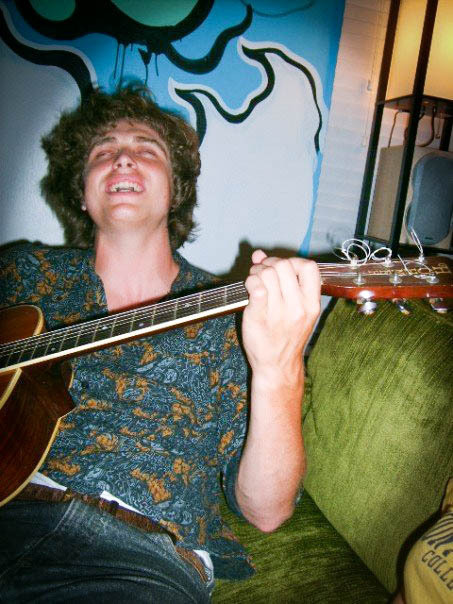
The bulk of Hunter’s extant poems were written after he returned to college at Tulane following a year at rehab and a sober-living transitional setting in Irving, Texas. Luther’s death, as well as Hunter’s recognition of his addiction and how closely it brought him to his own end, drew him into a more intimate communion with the world, with the kingdom of nature, with generation and decomposition, the place where the disintegration of our individual egos and selves brings us into harmony with the always-there of the essential, material universe. A year after Luther’s death, Hunter wrote in a letter to our friend Kat, “I don't get sad about [his death] anymore, though. Because fundamentally, I have changed the way I view the world. I still consider myself an atheist. But I think Luther knew, and I now know, that there is more to life than our waking existence.” The spiritual sense that Hunter developed in the few years before his death was firmly rooted in the physical world; a celebration of the dissolution of the little ego under the resonant knowledge that we are all connected, through matter in a united, harmonious whole. “I believe that for something to "exist" is must be a part of nature,” Hunter wrote in a letter from Irving, “I do not believe that anything exists outside of nature, because anything outside of nature would be incomprehensible to the human mind, and therefore cannot "exist." That said, I think there is a lot to the universe we don't understand….there are forces at play we simply cannot see, to be sure, and other forces we see only fleetingly, in dreams. I think dreams are just as real as waking life. “I believe people are the masters of their own destinies. I also believe everything happens the way it was meant to happen. And I don't care if those two ideas contradict each other.”

Much of Hunter’s writing is an intellectual and spiritual working-through of these ideas. Assertions of individual will are interrupted by surrender to numinous whole. In a journal entry written in 2010, Hunter reflects on an atheistic spirituality—a belief that one’s spirit is not bound to the individual self and needn’t be seen as existing outside of the natural, the material. Hunter writes, “A favorite division among recovery groups is physical, emotional, spiritual. Ultimately, all of these things are physical, that is, there is no immaterial aspect to them…I do believe that the spirit” far extends our understanding—and in the sense that time is fundamentally illusory, and that aspect of our psyche which is the spirit is an aspect which connects with the timeless aspects of existence, might even agree that it exists before we are born and is eternal. But it is only our spirit while we are living.” Hunter grew to understand death as a return to oneness with the always-there of the interconnected the universe, a mingling of basic elements which overtakes individuality and integrates us with the eternal-all. His poems map his growing belief in the mysterious connections between all matter, the awed conviction that “you are me/the ash is not the log, no,/but the heat diffuses like clouds/the filaments never leave the center”, that everything we have touched has existed from the beginning of time. The spirit radiating through Hunter’s work is the assertion that, as Wendell Berry writes, “I claim, and act, and am mingled in the fate of the world. Hunter found solace and meaning in the knowledge that everything we are, and touch, and experience was once joined in a single dense point of energy, that “each tree in this forest/rises from a single system of roots that never/dies,” and that, linked in this way, we “only appear separate”, and “there is no such thing as being alone” (“The Idea of Order at No Place in Particular”).
I miss Hunter profoundly, but I am eternally grateful that his work reminds me that we are never truly separated from each other. The links below contain the bulk of Hunter’s extant writing, sadly only a small portion of his entire body of work. I hope you enjoy visiting with him through his words.
Links to Hunter’s Work
Hunter Deely Poems: Main Group
Hunter Poems: Other Group
Hunter Prose
Peace and love to you,
Linnea
21 notes
·
View notes
Note
Roman and Celtic (not a widely accepted term) ‘insular’ Christianity aren’t hugely different in theology, but in geography. Ireland is alll the way over in the west, in the Atlantic sea. Migrating there took a lot of time and effort. So how the cultures of Ireland and of mainland Europe adopted Christianity, and what parts of their pre-Christian culture mixed with the religion, is what’s different.
Thank you for the response (and for doing it here instead of on the post so I couldn't lose it haha). I think @irishironclad identifies as Celtic Rite Catholic so I am going to ask him about the theology just for insight from someone who knows the beliefs if that's okay!
16 notes
·
View notes
Text
I think a big part of what makes batman villains so appealing (aside from being 100% pulp) is that so much batman media is like steeped in fashy rhetoric.
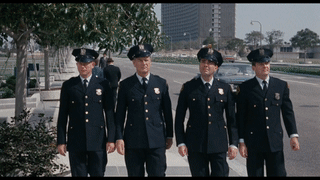
This city is like its own little non-materialistic insular world where the police are always outnumbered and on the brink of failure as they await the help of this noble, principled, troubled man that operates outside the law. There is a mentally unwell mastermind in every shadow, and truly they should be grateful for their lives as they are routinely locked away in a ghoulish, violent "mad house".
Playing Arkham Knight and being Batman as he stops common criminals from doing property damage in a city with (literally) no residents is just so chilling and odd. We have to protect these buildings. We have to protect these banks. These thugs need to be brought to justice with a brief beating on the street.
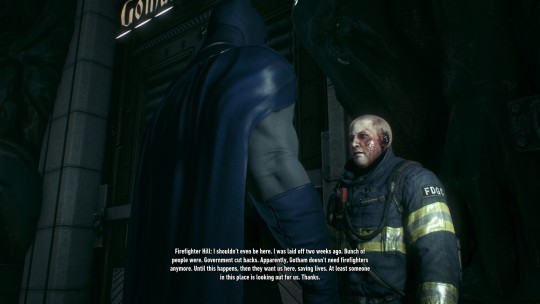
So of course any insight into what that world would look like in a more materialist sense is compelling. Any villain in that world is infinitely more interesting when you consider the kind of rhetoric they find themselves placed in. Accepting their role in the poem, trying to end the cycle, any and all action must come from recognizing how they are being framed by the forces that be.
#lab grown media#research.txt#long post#focus: batman#batman#gif#If you're unfamiliar with me allow me to clarify that this ISN'T me moralizing batman as something that's “bad” to like#I like a lot of batman stories. I like arkham knight QUITE a lot even.#I think a part of the appeal is the pseudo period-piece world and that gesture brings with it a lot of interesting baggage.
22 notes
·
View notes